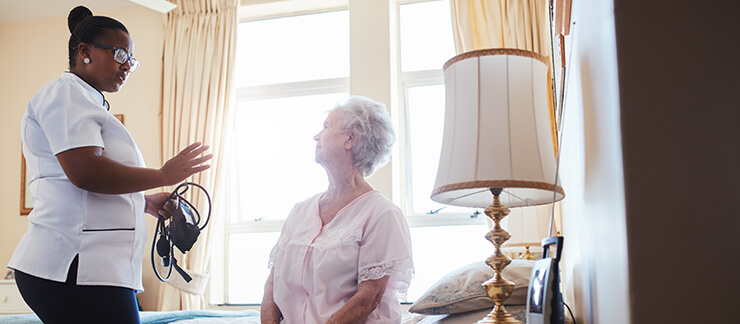
Signs Your Loved One is At-Risk for a Stroke and What You Can Do
Count to 40. Someone in the United States just suffered a stroke.
Now do that six times. Someone just died from a stroke.
Over 800,000 people will have a stroke annually in America, making it the fifth-leading cause of death and the leading cause of adult disability.
A stroke is an attack on the brain. It happens when blood flow to an area of the brain is cut off either from a blockage or breakage of a blood vessel in the neck or brain.
When blood can’t get to the brain, millions of cells begin to die. And the longer it’s left untreated, the more severe the damage.
That means that the clock is ticking when a stroke hits. Knowing what to look for and how to act is of the utmost importance.
Who is At Risk?
While stroke can strike anyone, women,
People with a family history of stroke or those who have suffered smaller blockages and strokes are also at greater risk.
If your loved one has recently had a stroke, or if you’re worried someone is at risk, Visiting Angels
Caregivers with years of experience treating at-risk patients will provide peace of mind for the family member tasked with daily care for a loved one.
Act F-A-S-T!
Stroke affects the brain, so it’s hard to realize when someone is having one. Detecting the signs of stroke and getting quick treatment is important because medication must be given within the first three hours of the onset of a stroke.
Think F-A-S-T to help detection:
- Face drooping. Is a part of the face numb or droopy? Is the smile lopsided?
- Arm weakness. Is one arm weak or numb? Can the arms be lifted or does one drop down?
- Speech difficulty. Is the speech slurred? Can a simple sentence be repeated?
- Time to call 911. If any of these symptoms are present, call 911 and tell the operator you are calling to report a stroke. Make note of the time of the first symptoms. Follow the operator’s instructions.
There may be other symptoms, including severe headaches with no known cause, dizziness or loss of balance and vision trouble from one or both eyes.
Strokes Can Be Prevented
Prevention is the path of least resistance. Managing any chronic condition and making healthy lifestyle choices can drastically reduce the odds of stroke.
To manage chronic conditions:
- Treat high blood pressure. Doing so is the most important way to avoid
stroke . - Manage diabetes. Diabetes causes destructive changes in the brain’s blood vessels and
increase the risk of stroke. - Treat high cholesterol. Too much cholesterol in the blood can build up on artery walls, increasing the risk of stroke.
To live healthier:
- Quit smoking. Smoking cigarettes can double your risk of stroke because it narrows and thickens blood vessels.
- Eat fruits and vegetables. A diet low in sodium, processed
foods and saturated fats greatly improves health. - Move more. Regular exercise helps ward off high blood pressure, high
cholesterol and diabetes.
If you’re worried that your loved one is at risk or might have suffered a stroke, seek immediate medical attention.
Then understand the different kinds of senior care available for your elderly loved one here.

